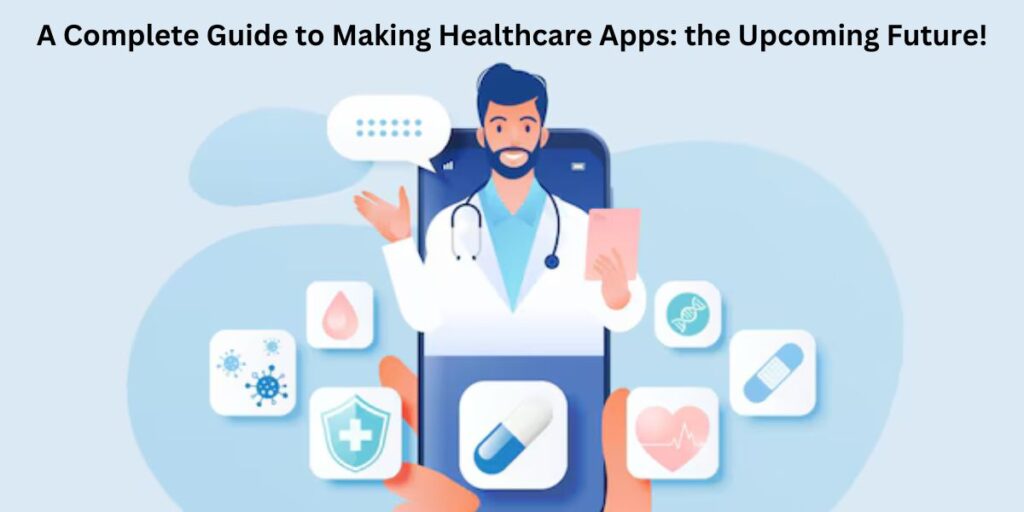In today’s fast-paced world, technology plays a vital role in shaping industries, and healthcare is no exception. Healthcare apps have become a game-changer, making it easier for patients to access medical services, book appointments, and even manage their health on the go. If you’re interested in healthcare app development, this guide will walk you through everything you need to know about creating successful healthcare applications, including the latest trends, future possibilities, and essential features.
Why Healthcare Apps are the Future
Healthcare apps have gained immense popularity in recent years. Patients, doctors, and healthcare providers all benefit from customized healthcare app development. With these apps, patients can keep track of their medical history, consult doctors remotely, and receive notifications about medications. For doctors and medical staff, healthcare apps help manage appointments, monitor patients remotely, and access medical data anytime.
Given the growing demand for convenient and fast healthcare services, the rise of healthcare apps is inevitable. They make healthcare more accessible, efficient, and user-friendly, ensuring that people can receive timely care without visiting a physical clinic. As technology advances, the future of healthcare app development looks brighter than ever.
Key Features of a Healthcare App
Before diving into the development process, it’s essential to understand the core features that every healthcare app must include. A well-designed healthcare app should focus on both the needs of patients and healthcare professionals. Here are some of the most important features:
1. User-friendly Interface
When developing a healthcare app, the user interface (UI) should be simple and intuitive. The app must cater to a wide range of users, including elderly patients who may not be tech-savvy. A clean and easy-to-navigate design ensures that users can access services without confusion.
2. Appointment Scheduling
One of the most sought-after features in a healthcare app is the ability to book appointments with doctors or specialists. Patients should be able to view available slots and schedule appointments with a few clicks. This not only saves time but also reduces the burden on hospital staff.
3. Telemedicine
Telemedicine is becoming a key aspect of modern healthcare apps. It allows patients to consult with doctors through video calls or messages, eliminating the need to visit the clinic for minor issues. During the pandemic, telemedicine services skyrocketed, and they continue to be an essential feature for future healthcare apps.
4. Health Monitoring
Many healthcare apps integrate with wearable devices like fitness trackers or smartwatches. These devices can monitor vital signs such as heart rate, sleep patterns, and activity levels, providing real-time health data. A healthcare app that syncs with wearables can offer users personalized insights and help them manage chronic conditions.
5. Prescription Management
Another valuable feature is the ability to manage prescriptions. Patients can view and refill their prescriptions through the app, receive reminders for medication, and even order refills from local pharmacies. This feature ensures patients stay on track with their treatment plans.
6. Secure Data Storage
Since healthcare apps deal with sensitive medical data, security should be a top priority. Personal health information must be encrypted and stored securely to comply with regulations like HIPAA in the United States. Developers must ensure that user data is protected from breaches or unauthorized access.
Steps to Develop a Healthcare App
Creating a healthcare app requires careful planning, collaboration with healthcare professionals, and following industry standards. Let’s go through the steps involved in healthcare app development.
1. Define the Purpose and Scope
Before starting development, it’s crucial to determine the app’s primary purpose. Is the app meant for patients, doctors, or both? Will it focus on telemedicine, health tracking, or appointment scheduling? Defining the app’s purpose will help narrow down its features and target audience.
2. Choose the Right Platform
Next, decide whether your app will be available for Android, iOS, or both. If you want to reach a wider audience, it’s best to develop for both platforms. You may want to partner with the best Android application development company to ensure smooth development for Android users. Additionally, consider whether you’ll develop a native app or opt for a cross-platform solution.
3. Focus on User Experience (UX)
User experience is everything when it comes to healthcare apps. Keep the design simple and ensure that the navigation is intuitive. Patients should be able to find what they need easily, whether it’s booking an appointment, tracking health data, or messaging a doctor. A cluttered or complicated design could lead to frustration and reduced usage.
4. Work with Healthcare Professionals
Collaboration with healthcare professionals is essential for developing an effective app. Doctors, nurses, and medical staff can provide insights into what features are most valuable, how patients interact with healthcare systems, and what information needs to be included. This partnership ensures that the app is both useful and practical.
5. Compliance with Healthcare Regulations
Healthcare is a highly regulated industry, and your app must comply with legal and industry standards. For example, in the U.S., healthcare apps must comply with HIPAA, which ensures that patient information is handled securely. In the EU, developers must comply with the General Data Protection Regulation (GDPR). Ensuring compliance from the start can save you from potential legal issues down the line.
6. Testing and Feedback
Once the app is developed, thorough testing is required to ensure that it works seamlessly. Test the app across different devices, operating systems, and network conditions. After the testing phase, release a beta version to gather feedback from users. This feedback is crucial for identifying bugs, improving the interface, and refining the app before the final launch.
Customized Healthcare App Development: A Growing Trend
One size does not fit all, especially when it comes to healthcare. Every hospital, clinic, and healthcare provider has unique needs. This is where custom healthcare app development comes into play. By developing a custom healthcare app tailored to specific requirements, healthcare providers can ensure that the app serves their patients more effectively.
For instance, a small clinic may need a simple app for appointment scheduling and patient management, while a larger hospital may require more advanced features like telemedicine, health data integration, and electronic health record (EHR) management.
Benefits of Customized Healthcare Apps
- Tailored Solutions: Custom apps are designed to meet the specific needs of healthcare providers, improving efficiency and patient care.
- Scalability: As the healthcare organization grows, a custom app can be scaled to accommodate more features and users.
- Branding: A custom app allows healthcare providers to build a unique brand identity, offering a personalized experience to their patients.
- Improved Efficiency: Custom apps streamline administrative processes, reduce paperwork, and improve overall patient management.
The Future of Healthcare App Development
The future of healthcare apps looks promising, with advancements in AI, machine learning, and data analytics transforming the landscape. Here’s what to expect in the coming years:
1. AI-Powered Diagnostics
Artificial intelligence (AI) is set to revolutionize healthcare by offering predictive diagnostics and personalized treatment plans. AI-powered healthcare apps can analyze vast amounts of data to help doctors make more accurate diagnoses and recommend the best treatment options.
2. Wearable Integration
As wearable devices become more advanced, healthcare apps will increasingly integrate with them to provide real-time health monitoring. Future apps could even detect early signs of illness, allowing patients to seek treatment before a condition worsens.
3. Blockchain for Data Security
Blockchain technology has the potential to improve data security in healthcare apps. By using blockchain, developers can ensure that patient data is encrypted, immutable, and protected from breaches.
4. Virtual Reality (VR) in Telemedicine
Virtual reality is also expected to play a role in healthcare, particularly in telemedicine. With VR, doctors can conduct virtual consultations that feel almost like in-person visits, providing a more immersive and effective experience.
Conclusion
Healthcare app development is a growing field with endless possibilities. From providing remote consultations to managing prescriptions, these apps have transformed the way patients and healthcare professionals interact. As technology continues to evolve, healthcare apps will only become more sophisticated, offering even greater convenience and better care. For those looking to develop a healthcare app, partnering with the best Android application development company and focusing on customized healthcare app development will ensure success in this rapidly expanding industry.



